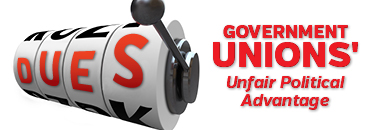Memo

Answering the Critics About Paycheck Protection
Under current law and contracts, it’s permissible for a school district’s personnel office to act as the collection agent for Political Action Committee contributions and membership dues on behalf of a government union. In fact, any taxpayer-financed government payroll systems can be negotiated in union contracts to automatically collect PAC and dues money directly from workers’ paychecks, just like taxes. These funds are then sent directly to union leaders, who can use the funds for lobbying, campaign contributions and other political action.
Taxpayers shouldn’t be forced to collect union campaign contributions and political money. No other political organization enjoys this special legal privilege. Paycheck protection laws can level the playing field and stop the use of taxpayer resources for politics. Paycheck protection laws vary by state. Some states require workers to give annual written consent before dues can be spent on lobbying. Other states prohibit government collection of any money used for political purposes, while a few states prohibit government collection of all union dues.
In a recent survey, 79% of Pennsylvania voters agreed taxpayer resources should not be used for political purposes.
Here are eight misleading claims about paycheck protection laws.
CLAIM: Union dues cannot be used for politics.
While union dues cannot be given directly to candidates, they can and are being used for a variety of other political activities. These activities include election mailers, get-out-the-vote drives, independent campaign activities, public marketing campaigns, expenses related to soliciting and administering contributions to the union’s PAC, and lobbying of legislators.
Pennsylvania’s largest government unions collectively spent nearly $5 million of member dues on political activities in 2012. Unions are required to document this information annually to the U.S. Department of Labor on a financial disclosure known as an LM-2.
Moreover, Government unions are allowed to have employees’ PAC contributions collected with taxpayer resources, which can be given directly to candidates.
CLAIM: Paycheck protection is an attack on collective bargaining.
Paycheck protection does not touch the process of collective bargaining. It only prevents unions from asking that taxpayer resources be used to collect their political dollars. Unions would still be free to bargain for wages and other benefits during the collective bargaining process.
CLAIM: Paycheck protection is partisan.
Paycheck protection is about good government. It doesn’t prevent unions from engaging in politics, it merely prevents taxpayer resources from being used to collect government unions’ political dollars.
CLAIM: This is an attack on unions and workers that will destroy the middle class.
Paycheck protection is pro-worker. As Julie, a Pennsylvania public school librarian explains: “Since money is automatically taken from my paycheck like a tax and handed over to the teachers union, they have no incentive to listen.” Paycheck protection makes unions more accountable to their members.
With paycheck protection laws in effect, unions will have to collect dues and political money directly from members, and demonstrate that those dollars are being well spent.
CLAIM: It costs virtually nothing to collect unions’ political money.
No taxpayer funds, regardless of how much, should be used for any political purpose. Using taxpayer-funded payroll systems to collect political money is no different than using a legislative office or taxpayer-provided phone for campaign fundraising, which is illegal.
Government union leaders enjoy an unfair advantage through taxpayer collection of union dues, a privilege no other political group enjoys. Every citizen and every organization—including government unions—should have an equal opportunity to engage in policy debates through a level playing field for all and favor should be given to none.
CLAIM: Paycheck protection laws violate the First Amendment.
Paycheck protection does not take away any union’s ability to collect dues, fees or PAC dollars or limit government unions’ ability to participate in political activities with which they disagree. It simply requires government unions to play by the same rules as everyone else, without taxpayer subsidies.
Paycheck protection laws actually promote free speech by preventing anyone from being forced to pay for politics. It is unfair and un-American to force taxpayers, as well as teachers and other government employees, to subsidize the political activities of a private organization.
In 2009, the Supreme Court ruled in Ysursa v. Pocatello that Idaho’s paycheck protection law, which prohibited taxpayer collection of political money, “does not restrict political speech, but rather declines to promote that speech by allowing public employee check-offs for political activities.”
CLAIM: Paycheck protection is just another attempt at union busting.
Paycheck protection would not affect unions that aren’t using taxpayer-funded payroll systems as collection agents, such as private trade unions.
Several states have passed paycheck protection, including states like Washington that don’t have right to work laws. Paycheck protection is not union busting, but simply a good government proposal to end the use of public resources to collect political funds.
CLAIM: Paycheck protection encourages “free riders” to accrue all the benefits of union membership without paying their fair share.
The reform would not change the relationship between unions and workers. In “compulsory union states” such as Pennsylvania, it will remain legal to require an employee to pay a “fair share fee” to cover the costs of representation and collective bargaining. If an employee declines, he or she may be fired. Paycheck protection would not change this legal arrangement.
However, federal law does not require unions to represent non-members. Pennsylvania’s Public Employe Relations Act of 1970 grants unions the power of “exclusive bargaining representative” over a group of employees, such as professional staff in a school district.
If unions are truly concerned about the “free rider” claim, state law could easily be amended to address that concern by limiting the terms of the contract to only those who pay dues to the union. Then non-dues paying employees could negotiate their own compensation (or they could organize separately to bargain), and any “free rider” problem would be solved.
# # #
Bob Dick is a policy analyst and Nathan Benefield vice president of policy analysis with the Commonwealth Foundation, http://www.CommonwealthFoundation.org.